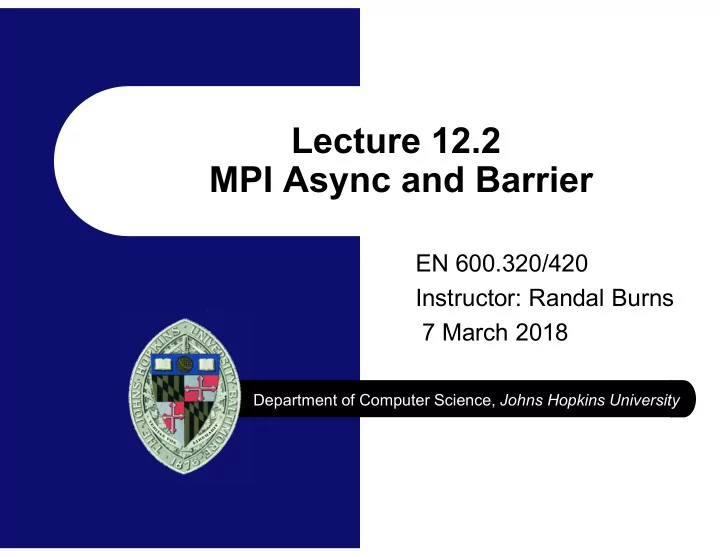

Lecture 12.2 MPI Async and Barrier EN 600.320/420 Instructor: Randal Burns 7 March 2018 Department of Computer Science, Johns Hopkins University
Tags: Out of Order Delivery MPI_Send (buff, count, datatype, dest, tag, comm ) MPI_Recv (buff, count, datatype, source, tag, comm ) Tag is an application defined concept used to determine delivery order – Specify a tag, get the message you desire, regardless of delivery order – There are wildcards to receive all messages (Reg. exps?) Communicator specifies a subset of nodes running a parallel application – Has a rank and size – Default MPI_COMM_WORLD Lecture 6: MPI
How about asynchronous I/O? MPI has support for non-blocking I/O – Send/recv request (returns as soon as resources allocated) – MPI_Isend( … ) – Do some useful work – MPI_Wait( &request, &status ) //finalize MPI_Wait: a wait the completion of operation MPI_Test: check the completion of operation and return immediately Program must leave buffer intact until completion! – Tie up memory in application space – Source of errors Lecture 6: MPI
(Aside) MPI_SendRecv For pairwise exchange, MPI_SendRecv – Always non-blocking – Useless: doesn ’ t implement pairwise communication Don’t use it’s lazy and inefficient Lecture 6: MPI
Asychronous I/O Useful? Forces for: – Overlap communication with computation Forces against: – Ties up buffers – Complex code – Little overlap available for time-step synchronous programs Use as a last resort – Remember the runtime is trying to do this for you Lecture 6: MPI
Synchronization Implicit synchronization (blocking send/receives) – Most common model – Allows for fine-grained dependency resolution Explicit synchronization (barriers) – MPI_Barrier ( MPI_COMM_WORLD ) – All processes must enter barrier before any continue – Coarse-grained stops all – Common when interacting with shared resources, e.g. parallel file systems or shared-memory (when available) Lecture 6: MPI
http://www.mpitutorial.com/mpi-broadcast-and- Barrier collective-communication/ Illustrated Lecture 6: MPI
Barriers vs. Send/Receive Barriers are useful when awaiting a global condition: – Data ready – Previous pipeline complete – Library call finished – Checkpoint written But, not a good replacement for pairwise sends and receives – They allow nodes to complete whenever their local synchronization constraints are met – Barriers are global and create global stalls Lecture 6: MPI
Recommend
More recommend